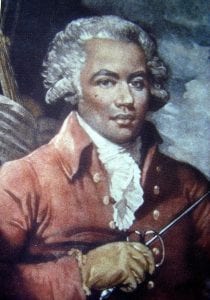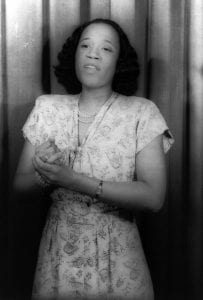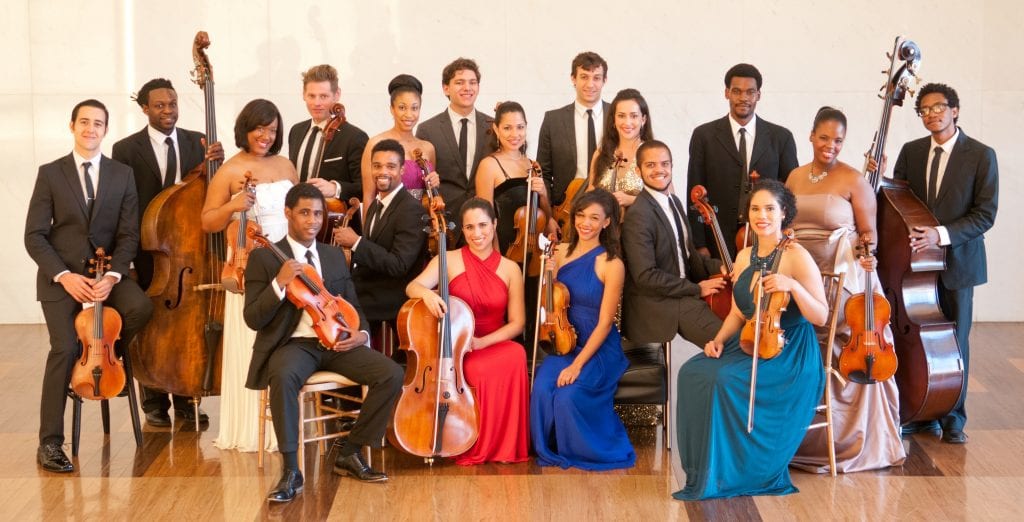This Black History Month, we take a look at two dynamic musicians of African descent and a modern organization that is spearheading a more diverse future. Read below about the French composer who led the best orchestra in Paris, the American opera star who stunned audiences with her voice, and an organization that is creating positive change on a national scale.
Putting Diversity Center Stage
Joseph Bologne, Chevalier de Saint-Georges (1745-1799)

Joseph Bologne, Chevalier de Saint-Georges (1745-1799).
Joseph Bologne, Chevalier de Saint-Georges, was a master fencer, a military leader during the French Revolution, a virtuoso violinist, and the first classical composer of African descent. He was born in Guadeloupe, the son of a slave and her wealthy French master, and moved to France as a young child. While not much is known about his early musical training, Saint-Georges must have practiced violin extensively in his youth because he emerged in 1771 as the concertmaster of Le Concert des Amateurs, an ensemble of amateurs and professionals from the King’s Royal Academy. Later he would become the director and performances he conducted were so high profile that the Queen of France, Marie Antoinette, regularly attended.
Despite his fame and status at court, he had to endure tremendous prejudice in his career, particularly in relation to his operas. At the premiere of his first opera, Ernestine, audience members interrupted the opera by imitating whip-cracking sounds and shouting “Ohé!” (Yoo-hoo!). The opera was deemed a failure, yet Saint-Georges persevered. In addition to writing violin concertos, string quartets, and symphonies concertantes, he went on to write five more operas, which were quite well received by the public. Only one of these operas, L’Amant anonyme, survives in full manuscript today.
Saint-Georges is an incredibly important figure in classical music history, who sadly has been mostly forgotten. He was one of the first French composers to embrace the string quartet, now one of the most prominent forms of chamber music. Performances of Saint-Georges’ first string quartets in 1772 were extremely well-received, and earned him a following that would support his later compositions. Saint-Georges’ string quartets were composed and premiered less than ten years after the publication of Haydn’s first string quartets – which are considered to be the first string quartets in the classical form. Saint-Georges’ contributions paved the way for people of color in classical music. But to this day, there is still a severe lack of representation of people of color in all aspects of classical music. For any performers or influencers looking to remedy the imbalance, Joseph Bologne, Chevalier de Saint-Georges’ work can be found on IMSLP as a starting point for programming more works by people of color.
Camilla Williams (1919-2012)

Camilla Williams, 1946. Credit: Carl Van Vechten [Public domain], via Wikimedia Commons
The early stages of Williams’ career were during the time of segregation in America, and she had to withstand racism on and off stage. In public transportation, Williams had to sit in the back of the train, while her white accompanists sat in front. Leading up to her debut with the New York City Opera, the white male who was to play Pinkerton (the leading male role) wrote to the mayor of New York in protest for having to perform alongside a black singer. Williams recalls from that time, “I had to stay in people’s homes [when I travelled to perform] because hotels wouldn’t have me.”1
Yet, the quality of her character and artistry could not be denied and she had a monumentally successful career. Williams had an international presence and even served as a cultural ambassador for the United States. She was a symbol to many, and as such, it was Williams who sang the national anthem at the 1963 March on Washington that preceded Dr. Martin Luther King Jr.’s iconic “I Have a Dream” speech. Later in life, Williams became a Professor of Voice at Indiana University, where she taught for 20 years shaping the next generation of musicians.
Camilla Williams showed segregated America that an African American – and a woman – could perform at the highest level and make an important contribution to American culture. She is remembered fondly for her dynamic portrayal of lead roles and will be remembered for the impact she had on the classical community.
The Sphinx Organization

Annelle Gregory, 2017 first place senior Laureate (credit: Kevin Kennedy)
The Sphinx Organization has served over 20 million people, transforming lives through the power of diversity in the arts. The Detroit-based organization was founded to address the stark under-representation of people of color in classical music. Aaron P. Dworkin originally founded Sphinx while he was a student at University of Michigan, seeing the need for an entity to help balance the lack of diversity both on stage and in the audience of concert halls.
Sphinx offers a variety of programs that further its mission to create positive change in the arts field and in communities across the country, with programs in four main categories: Education and Access, Artist Development, Performing Artists, and Arts Leadership. This multi-faceted approach has allowed Sphinx to have a tremendous impact on its community in Detroit, and beyond. The Overture program, for example, offers free beginning violin lessons in select Detroit and Flint schools. Not only are the lessons free, but instruments are provided for students who enroll. Sphinx also offers a variety of scholarship programs to help students further their education and provide quality instruments, and continually provides performance opportunities through competitions and ensemble programs.

Sphinx Virtuosi at the Kennedy Center Terrace Theater (credit: Kevin Kennedy)
Sphinx has grown to have a national presence, and the heart of what it does lies in providing opportunities for young people to engage in classical music. Its grassroots approach has connected over 100,000 students to classical music and shown how powerful diversity in the arts can be. By providing resources for youths, Sphinx is impacting the next generation of musicians and their families. Sphinx is making the stage more diverse and bringing in a more diverse audience to performances. It is a model to other performing arts organizations and if its current track record is any indication of what the future holds, the next 10 years will be an exciting time for classical music.
Our hope is that through advocacy we can shed a light on the forgotten contributions of people of color to classical music, allowing a more diverse future to unfold. Although it’s certainly fitting to celebrate Williams and Saint-Georges in February, we need to highlight the life-changing musical contributions of all people of color throughout the year. We need to build a future where all people are welcome to express themselves through music.
1. http://www.telegraph.co.uk/news/obituaries/9055112/Camilla-Williams.html








Leave a Reply